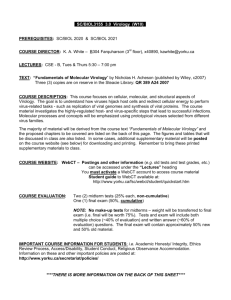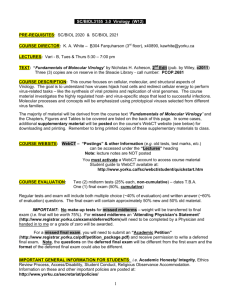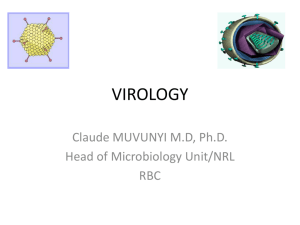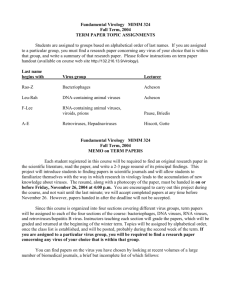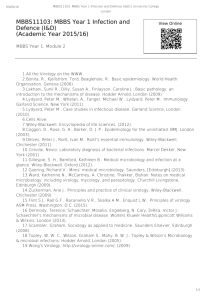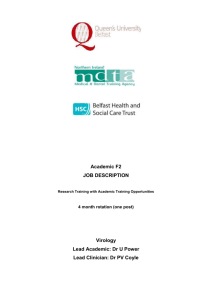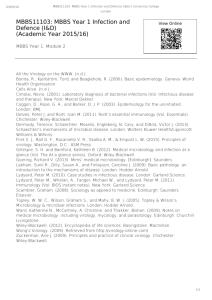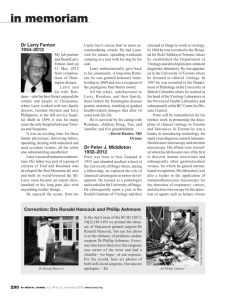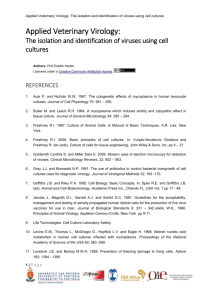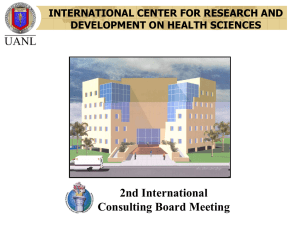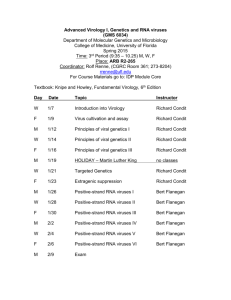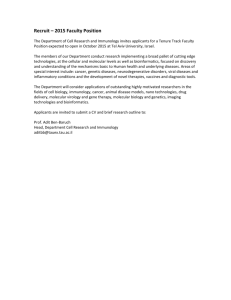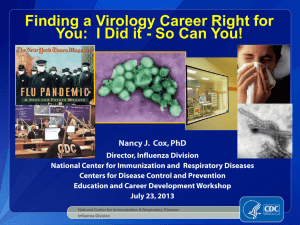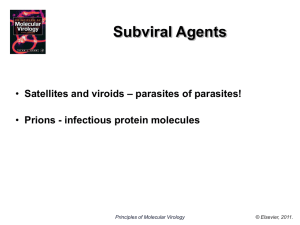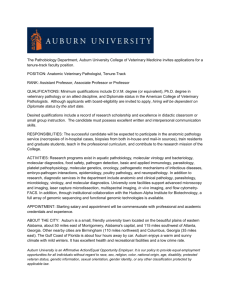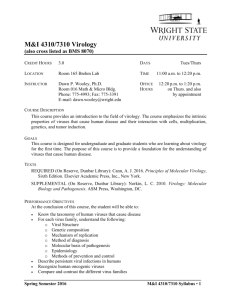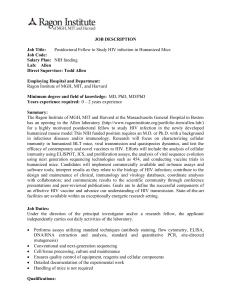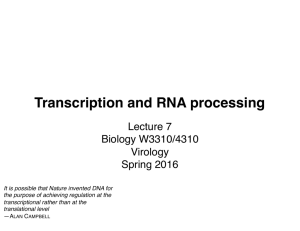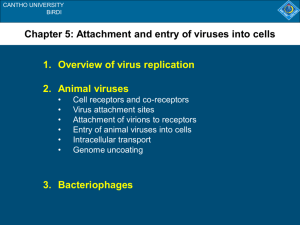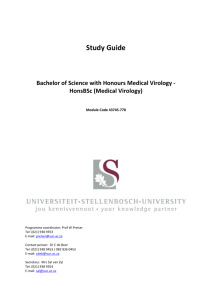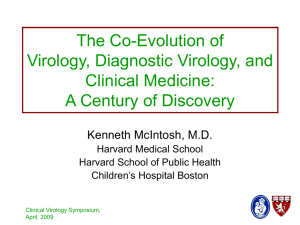Advanced Virology
advertisement
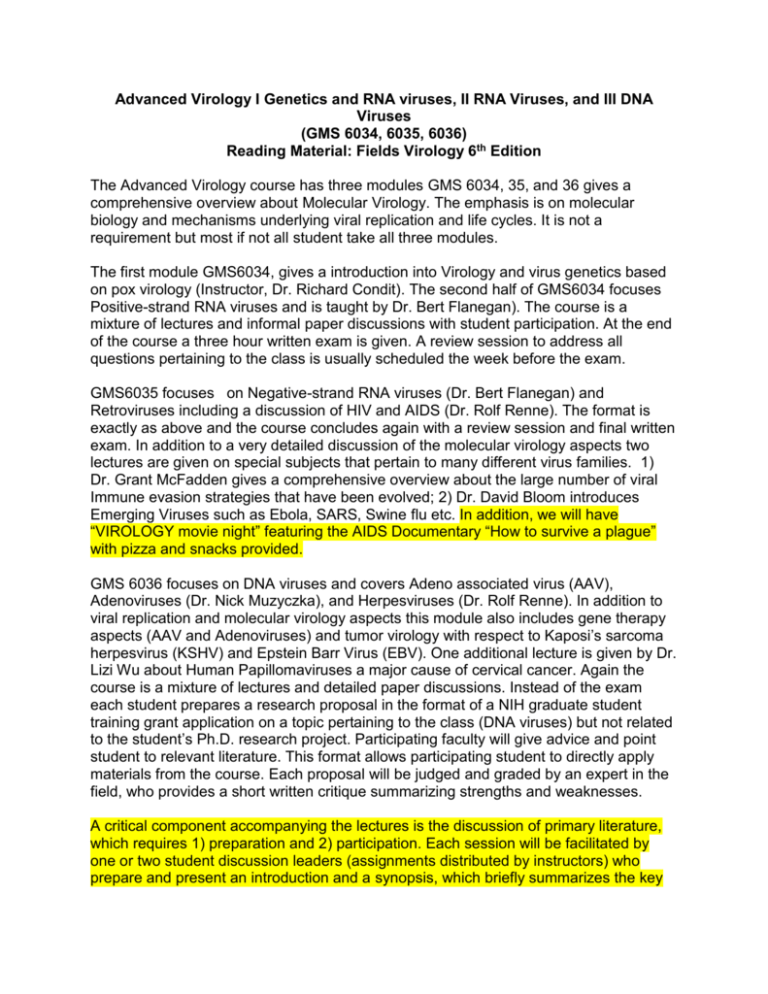
Advanced Virology I Genetics and RNA viruses, II RNA Viruses, and III DNA Viruses (GMS 6034, 6035, 6036) Reading Material: Fields Virology 6th Edition The Advanced Virology course has three modules GMS 6034, 35, and 36 gives a comprehensive overview about Molecular Virology. The emphasis is on molecular biology and mechanisms underlying viral replication and life cycles. It is not a requirement but most if not all student take all three modules. The first module GMS6034, gives a introduction into Virology and virus genetics based on pox virology (Instructor, Dr. Richard Condit). The second half of GMS6034 focuses Positive-strand RNA viruses and is taught by Dr. Bert Flanegan). The course is a mixture of lectures and informal paper discussions with student participation. At the end of the course a three hour written exam is given. A review session to address all questions pertaining to the class is usually scheduled the week before the exam. GMS6035 focuses on Negative-strand RNA viruses (Dr. Bert Flanegan) and Retroviruses including a discussion of HIV and AIDS (Dr. Rolf Renne). The format is exactly as above and the course concludes again with a review session and final written exam. In addition to a very detailed discussion of the molecular virology aspects two lectures are given on special subjects that pertain to many different virus families. 1) Dr. Grant McFadden gives a comprehensive overview about the large number of viral Immune evasion strategies that have been evolved; 2) Dr. David Bloom introduces Emerging Viruses such as Ebola, SARS, Swine flu etc. In addition, we will have “VIROLOGY movie night” featuring the AIDS Documentary “How to survive a plague” with pizza and snacks provided. GMS 6036 focuses on DNA viruses and covers Adeno associated virus (AAV), Adenoviruses (Dr. Nick Muzyczka), and Herpesviruses (Dr. Rolf Renne). In addition to viral replication and molecular virology aspects this module also includes gene therapy aspects (AAV and Adenoviruses) and tumor virology with respect to Kaposi’s sarcoma herpesvirus (KSHV) and Epstein Barr Virus (EBV). One additional lecture is given by Dr. Lizi Wu about Human Papillomaviruses a major cause of cervical cancer. Again the course is a mixture of lectures and detailed paper discussions. Instead of the exam each student prepares a research proposal in the format of a NIH graduate student training grant application on a topic pertaining to the class (DNA viruses) but not related to the student’s Ph.D. research project. Participating faculty will give advice and point student to relevant literature. This format allows participating student to directly apply materials from the course. Each proposal will be judged and graded by an expert in the field, who provides a short written critique summarizing strengths and weaknesses. A critical component accompanying the lectures is the discussion of primary literature, which requires 1) preparation and 2) participation. Each session will be facilitated by one or two student discussion leaders (assignments distributed by instructors) who prepare and present an introduction and a synopsis, which briefly summarizes the key findings, with special emphasis on how they were derived from the experimental data reported. Participation is part of the grading for all three modules and unexcused absences from literature discussions will result in letter grade reductions. Requirements: This course is not intended for first year IDP students who should take the Infectious Disease course offered my MGM and directed by Dr. Scott Tibbetts. Student should have background in basic molecular biology and biochemistry and have some introduction into infectious disease, virology, microbiology etc. Students from College of Veterinary Medicine have also successfully taken the course. We make exceptions for students who obtained a masters student with Virology background. In case of questions please do not hesitate to contact Rolf Renne (Course Coordinator), (rrenne@ufl.edu).
